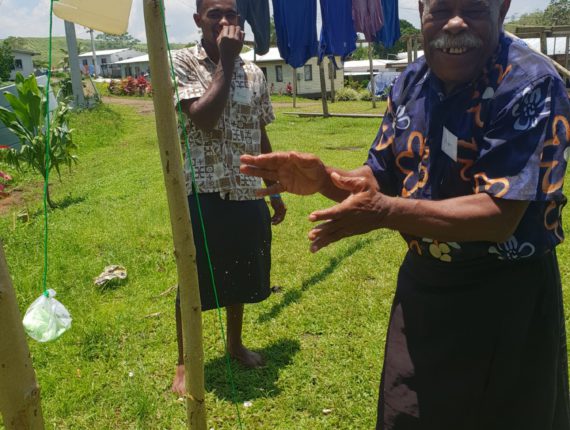March 22nd marks World Water Day 2021 and the theme is what is water means to people and its true value and how we can better protect this vital resource.
This project is in partnership with DFAT’s (Department of Foreign Affairs and Trade), Water for Women, and our implementing partner Habitat for Humanity Fiji.
We all know water is important to us. Water means life. Yet, today water is under extreme threat not least of all from climate change. Pacific island countries contribute less than 0.03 percent of the world’s total greenhouse gas emissions but are the most vulnerable to the worsening impacts of climate change. Impacts are being felt first-hand in villages on the Fiji islands. Traditionally dry-spells in Fiji last from May to October but that is changing.
Osea Suka is one of our partner families who lives in Navitilevu village. Navitilevu is one of 18 communities that Habitat for Humanity Fiji is working with as part of the Water for Women funded Strengthening community resilience and inclusion through improved Water, Sanitation and Hygiene (WaSH) services project.
Sadly, Osea and the other villagers now face water shortages from July through to December meaning water conservation has become part of their daily life.
Osea shares how they are overcoming the challenges of water shortage. “My wife always puts out containers and buckets whenever it rains and this is particularly useful for us also as our WaSH facilities are not nearby” says Osea, but with longer dry spells their water tanks are drying out more often and his family often struggle to wash hands after using the toilet.
Earlier in the year in February 2021, Habitat for Humanity Fiji completed a 3-day water, sanitation and hygiene training in Navitilevu, where community members including Osea and the Community Health Worker Rasilivia Navo learnt about the benefits of a Tippy Tap.
“I found that it was a very simple design that I could easily build and at home, my kids would love to use it and it would encourage them to wash their hands frequently especially after playing outdoors.” shared Osea. He adds that the Tippy Tap would be one way to teach his kids about good hygiene practices. Community health worker Rasilivia adds: “It’s easy for people to use and even for us women, we’ve requested the youths to install tippy taps for our homes. For me, our bathroom and sanitation facilities is located at quite a distance from my home, so I find that the tippy tap would help encourage frequent handwashing.”
Now through the use of Tippy Tap Osea and his family don’t have to travel long distance to wash their hands or access clean water. The Tippy Tap has become an easy and accessible contraption to help communities like Osea’s preserve and access water preventing water shortage and illness due to consuming dirty water or not washing hands.
In partnership with:



